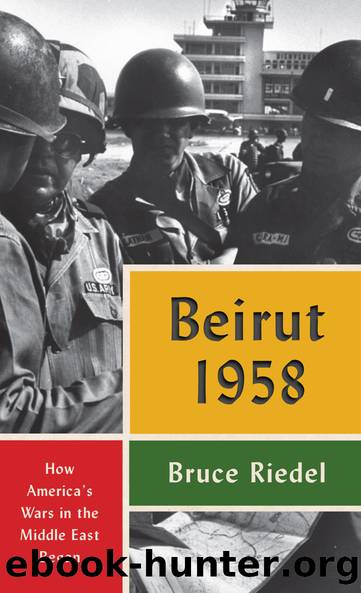Beirut 1958 by Bruce Riedel;

Author:Bruce Riedel; [Неизв.]
Language: eng
Format: epub
Publisher: Lightning Source Inc. (Tier 3)
Four
BAGHDAD AND WASHINGTON
The phone rang in the communicatorâs bedroom just before four in the morning on July 14, 1958. John and his wife had arrived in April in Iraq after a tour of duty in Beirut. (John served in the intelligence community and his full name is classified.) The call was from his boss in the embassy in Baghdad. John was urgently needed to open the communications office to send messages to Washington. Communicators had an unglamorous but crucial role in the world of diplomacy and espionage. They ensured that coded messages moved back and forth from missions all over the world. They spent long hours at work and could be called in at a momentâs notice, even when the embassy was closed.
A car picked John up, and he heard gunfire as they drove to the embassy. Later in the morning, he brought his wife by car to the embassy, as well, for her safety. Two days later, she was evacuated from the country; it was the most frightening moment in their career. Along the highway to the airport, dead bodies of regime loyalists hung from the street lights. John and his wife worried they would be killed at any moment, and in fact, some Western businessmen were assassinated. John would leave Baghdad in December, just six months after his arrival.1
The July 14, 1958, coup had come as a complete surprise to Washington and London. Both the United States and the United Kingdom had long suspected the monarchy might be vulnerable to a coup, but neither had any warning of the crisis when it arrived.2
Modern Iraq, like Trans Jordan, was Winston Churchillâs creation. In 1921, at the Cairo conference where he created the Emirate of Trans Jordan for Abdallah, Churchill had stitched together three provinces of the former Ottoman EmpireâBasra, Baghdad, and Mosulâinto a new country, to be named either Mesopotamia or Iraq. The borders were drawn, for the most part, with straight lines, and Faisal I was made king.3 He had never visited Iraq before, and when he arrived at Basra on June 24, 1921, to take up his throne, there was no one to meet him. Only empty train stations greeted him, all the way to Baghdad. It was an inauspicious start.4
The British gave Iraq independence in 1932. Faisal died in 1933 and was succeeded by a weak son, Ghazi, who held the throne until his own death in a car accident in 1939. Faisal II, Ghaziâs son, born in 1935, was underage, so a cousin, Abdallah, ruled as regent until Faisal II came of age in 1953. During the second world war, a military coup briefly installed a pro-German government in 1941, and the British invaded Iraq to prevent the military regime from allying the country with Nazi Germany. The Arab Legion played a part in that invasion, and Rashid Ali, the pro-Nazi Iraqi politician, fled to Saudi Arabia. During the military regime, Abdallah lived in exile in Amman.
After the war, in late 1945, Abdallah visited the United States and was feted at the White House at Harry Trumanâs first state dinner as president.
Download
This site does not store any files on its server. We only index and link to content provided by other sites. Please contact the content providers to delete copyright contents if any and email us, we'll remove relevant links or contents immediately.
| Africa | Americas |
| Arctic & Antarctica | Asia |
| Australia & Oceania | Europe |
| Middle East | Russia |
| United States | World |
| Ancient Civilizations | Military |
| Historical Study & Educational Resources |
The Dawn of Everything by David Graeber & David Wengrow(1567)
The Bomber Mafia by Malcolm Gladwell(1519)
Facing the Mountain by Daniel James Brown(1428)
Submerged Prehistory by Benjamin Jonathan; & Clive Bonsall & Catriona Pickard & Anders Fischer(1375)
Tip Top by Bill James(1291)
Wandering in Strange Lands by Morgan Jerkins(1281)
Evil Geniuses: The Unmaking of America: A Recent History by Kurt Andersen(1269)
Red Roulette : An Insider's Story of Wealth, Power, Corruption, and Vengeance in Today's China (9781982156176) by Shum Desmond(1267)
The Way of Fire and Ice: The Living Tradition of Norse Paganism by Ryan Smith(1258)
Driving While Brown: Sheriff Joe Arpaio Versus the Latino Resistance by Terry Greene Sterling & Jude Joffe-Block(1230)
American Kompromat by Craig Unger(1213)
F*cking History by The Captain(1196)
It Was All a Lie by Stuart Stevens;(1191)
American Dreams by Unknown(1153)
Treasure Islands: Tax Havens and the Men who Stole the World by Nicholas Shaxson(1151)
Evil Geniuses by Kurt Andersen(1142)
White House Inc. by Dan Alexander(1122)
The First Conspiracy by Brad Meltzer & Josh Mensch(1075)
The Fifteen Biggest Lies about the Economy: And Everything Else the Right Doesn't Want You to Know about Taxes, Jobs, and Corporate America by Joshua Holland(1029)
